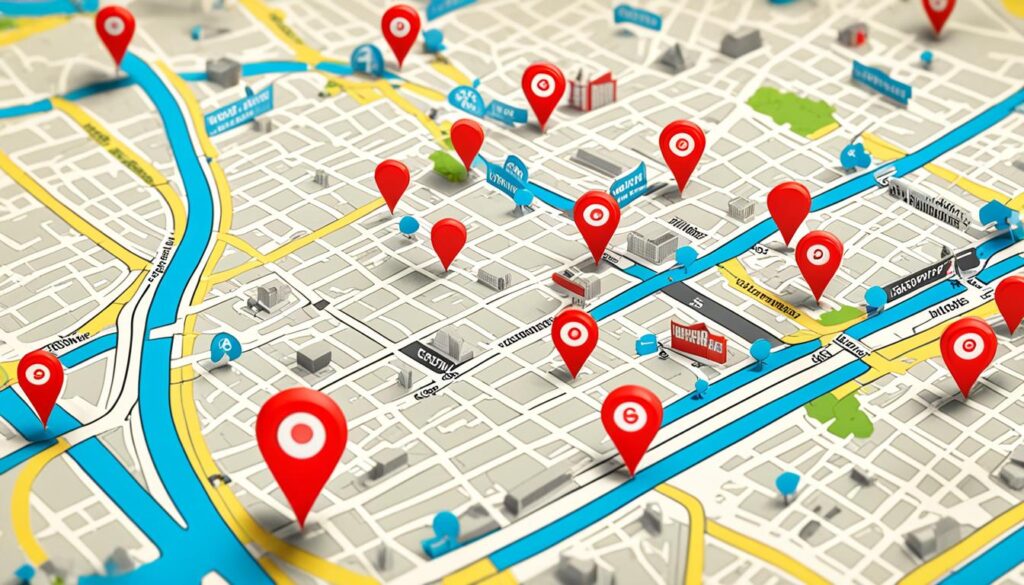SEO: Boost Your Website’s Visibility and Drive Traffic (A Step-by-Step Guide)
In today’s world, everyone is fighting for space online. This is where search engine optimization (SEO) is key. As a professional copywriting journalist, I’m thrilled to offer you a detailed guide. It will show you how to increase your website’s visibility and bring in more visitors using smart SEO methods.
Now, let’s spark some thinking: Are you making the most of SEO to reach your audience and meet your business goals? Many in business underestimate how powerful a strong online presence can be. In this piece, I’ll dive into why SEO is vital, map out how to boost it, and give you the tools to make your website shine.
Key Takeaways:
- Understand the pivotal role of SEO in improving online visibility and website traffic.
- Discover the essential steps to conduct keyword research and optimize your website’s content.
- Leverage on-page and off-page SEO strategies to enhance your search engine rankings.
- Implement technical SEO best practices to ensure your website is optimized for performance and mobile-friendliness.
- Measure and analyze your SEO efforts to make data-driven decisions and continuously improve your strategies.
Understanding the Significance of SEO
SEO is now a big part of making it online. It’s all about tweaking your website and content to rank higher in search results. By recognizing SEO’s importance, your site can reach more people. This helps your business grow as more folks find you online.
Why SEO Matters for Online Visibility
Getting noticed online is key to attracting new visitors. SEO helps your site show up higher in searches, meaning more people can find you. This leads to increased visits and more opportunities for sales or service use.
The Impact of Search Engine Rankings on Website Traffic
Where your site ranks affects how many people visit it. Better search positions mean more visibility, getting you more visitors. SEO helps tweak your website so you can reach the top of search results. This boosts visits, helping your business reach and grow.
Conducting Keyword Research
Good keyword research is key to a strong SEO plan. It’s about finding the words and phrases your audience uses. This helps your site rank higher in searches, getting more views and the right people to your site.
Identifying Relevant Keywords for Your Business
Start by thinking about what your customers might search for. What questions do they have? What are the problems they need help with? Make a list of keywords that fit your products or services, ranging from general to very specific ones.
Tools and Techniques for Effective Keyword Research
Use keyword tools to refine your list and find new ideas. Tools like Google Keyword Planner, SEMrush, Ahrefs, and Moz can show you search volume and competition. They also suggest related keywords, helping you focus your strategy.
Looking at what keywords your competitors use can also be helpful. It shows where there might be chances to stand out. With this info, you can work on a smarter keyword plan that sets you apart.
Optimizing Your Website’s Content
After picking out important keywords for your business, it’s time to tweak your site’s content. Make it meet those keywords and follow the rules of top search engines. Crafting SEO-friendly content means making top-notch, engaging stuff. This not only attracts your audience but also shows search engines your website is full of good information.
Crafting SEO-Friendly Content
Create SEO-friendly content by focusing on what your audience wants. Keep your content clear, well-organized, and valuable. Place your key phrases wisely throughout your text and titles. This keeps your writing smooth but effective.
Incorporating Keywords Strategically
Getting keyword optimization right is key to being seen on search engines. Place your keywords in your content naturally. Don’t stuff them in where they don’t fit. Try out different ways to use keywords. See what works best for your niche and readers.

On-Page SEO Optimization
Improving your search engine visibility starts with on-page SEO. This means focusing on your title tag and meta description. These elements are vital for better searching and ranking results.
Optimizing Title Tags and Meta Descriptions
Your title tag is what people first see on search results. It’s key in showing your page’s relevance and getting clicks. To enhance your
on-page seo, craft titles that are short yet eye-catching and full of the right keywords.
Your meta description further explains what the page is about. Use it to draw users in. Focus on making it accurate and appealing for better meta description optimization. This will entice more users to visit your site.
Enhancing Page Headings and URL Structure
Using clear page headings and URLs is also crucial. It helps search engines understand and index your content better. Make sure your page headings tell what the content is about. This guides the search engines.
Your url structure optimization should be clear and keyword-rich. This makes your website’s SEO stronger.
| On-Page SEO Element | Best Practices |
|---|---|
| Title Tags |
|
| Meta Descriptions |
|
| Page Headings |
|
| URL Structure |
|
Off-Page SEO Strategies
Working on your website’s content is important, but off-page strategies are key too. They are vital for making your site more visible in search results. You should focus on getting good quality backlinks and using social media well.
Building High-Quality Backlinks
Getting good, relevant backlinks is crucial for off-page SEO. Links from other respected sites show search engines your site is solid. This boost helps in link building, improving your off-page seo. Ways to get these links include writing for blogs in your field, joining online communities, and using partnerships.
Leveraging Social Media for SEO
These days, social media seo is a big deal for SEO outside your site. Being active on platforms and talking to your followers can improve your SEO. This is because search engines see it as a sign of trust and relevance. Sharing your content and talking to your audience can really help.

SEO
SEO is key in every winning digital marketing plan. It involves tweaking your site and online spot to match search engines and user needs. This can make your site easier to spot, bring in more right visitors, and boost real-world results.
The Importance of Search Engine Optimization
Today, making sure your site stands out online is vital. Search engines, like Google, connect prospective clients with your offerings. With the right SEO best practices, you can lift your site in search results. This way, it’s simpler for your audience to discover and connect with your business.
Staying Up-to-Date with SEO Best Practices
The SEO trends and updates are always changing. Search engines keep tweaking their rules to better serve users. It’s essential to stay on top of SEO best practices to keep your edge. This means updating your content, tech stuff, and strategies off your site, so you stay visible and up-to-date on search results.

Technical SEO Considerations
Enhancing your website’s content and off-page tactics is vital for SEO. But, paying attention to technical SEO is equally crucial. This includes making sure your website loads fast and looks good on mobiles. This leads to better search engine rankings and a more pleasant experience for visitors.
Site Speed Optimization
The time your website takes to load is very important for both search engines and users. Google likes websites that load quickly because they offer a better experience. To boost your website’s speed, work on things like making images smaller, reducing code, and quickening server response times. Doing these things will make your website load faster, which will help its technical SEO standing.
Mobile-Friendliness and Responsive Design
With so many people using mobile devices, your website must work well on them. Mobile optimization and responsive design make sure your website looks good and works properly on any screen size. This is not only good for search engine rankings but also for keeping visitors happy, no matter how they access your site.
| Technical SEO Factors | Impact on Search Engine Rankings |
|---|---|
| Site Speed Optimization | Faster load times lead to improved user experience and higher search engine rankings. |
| Mobile-Friendliness and Responsive Design | Websites that are optimized for mobile devices are prioritized in search engine results, improving overall visibility and accessibility. |

Local SEO Tactics
If your business is based in a certain area, local SEO tactics are key. They help you show up more in online searches. This way, you can get more local customers to notice and choose your business.
Optimizing for Local Search Queries
Local SEO means getting your online info ready for local searches. You do this by adding local terms to your website and listings. Things like your city or neighborhood should be included. Making specific web pages for different areas also boosts your reach.
Leveraging Online Directories and Citations
Getting your business on online directories is a big plus for local SEO. Websites like Google My Business and Bing Places make it easy. By adding your business correctly on these sites, you become more visible in local searches. Be sure your business info is correct and consistent everywhere online.

| Tactic | Description | Benefits |
|---|---|---|
| Local SEO | Optimizing your online presence for location-based search queries | Improved visibility and more relevant, local customers |
| Online Directories and Business Citations | Claiming and optimizing your listings on platforms like Google My Business and industry-specific directories | Enhanced local search rankings and increased trust signals |
Measuring and Analyzing SEO Performance
Good SEO analytics isn’t just about starting SEO projects. It needs you to watch and understand how well your site does. Tools like Google Analytics and Google Search Console are key. They help you see how your site appears in searches. This tells you what to change to boost your SEO strategy.
Setting Up Google Analytics and Search Console
Adding Google Analytics and Google Search Console to your site is vital. They give tons of info on who visits your site and how it’s found in search engines. This info helps spot ways to do better and make smart choices based on data.
Interpreting and Acting on SEO Data
When your SEO analytics tools are ready, it’s time to check the data. Look into things like how many people find your site by search, what keywords work best, and how many visitors stay on your site. This helps you understand how your site is really doing and what to improve.
Always remember, checking your SEO performance regularly is very important. It lets you keep making your SEO strategy better. This way, you get the best results over time.
Content Marketing and SEO
The link between content marketing and SEO is strong. Together, they can help you show up more online. They help you catch the eye of your desired audience too.
By following SEO and content marketing rules, your content becomes top-notch. It speaks to your customers and also does well with search engines. This way, you get better rankings and more people visit your site.
Creating High-Quality, Engaging Content
Making content that’s interesting and helpful is key for success. The goal is to make stuff that people enjoy and learn from. Add in the right words and phrases to show search engines your content is important.
Promoting Content for Maximum Visibility
But making great content isn’t enough. You need to get the word out about it. Use social media, emails, and reach out to known people in your field. By doing this, more people will see your content. And, it’s more likely to rank better on search engines. This way, more people will visit your site.
SEO and User Experience
SEO is not just about technical stuff and writing good content. It’s also about how people feel when they visit your site. A great user experience (UX) makes visitors happy to be there. This keeps them coming back even after they find you in search results.
Enhancing Website Navigation and Structure
Making your site easy to move around on is very important. You should make sure people can find things quickly and without trouble. This makes both visitors and search engines like your site more.
Good navigation helps pages get found online and makes your visitors’ journey smooth. They will find what they want faster. This keeps them satisfied and helps you achieve your site’s goals.
Optimizing for User Intent and Search Queries
Just using the right keywords is not enough. You have to really understand what people are looking for. Then, you can align your site to meet those needs. This creates meaningful content and experiences for users.
Understanding what people really want helps you connect better with them. This approach not only boosts your search ranks but also makes your audience stay longer. They will engage more, buy more, and keep coming back to your site.
